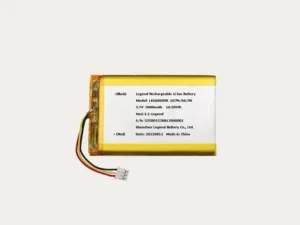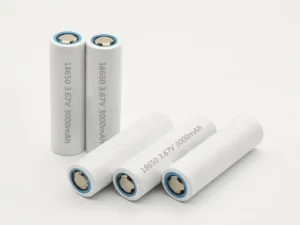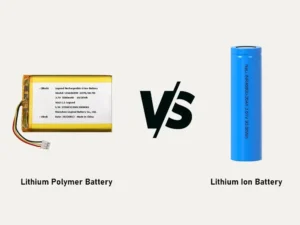Introduction:
In recent years, the advancement of technology has led to demand for high-performance batteries. This is true, especially in portable electronic devices and electric vehicles. Among the various battery technologies available, lithium-based batteries have gained significant popularity. This is due to their high energy density and long cycle life. There are two prominent types of lithium-based batteries. They are lithium polymer (LiPo) and lithium-ion (Li-ion) batteries. This article explores the differences and advantages between lithium polymer battery VS lithium ion battery. This info compares lithium polymer batteries to lithium-ion batteries. It helps users make informed decisions based on their specific needs and requirements.
Lithium Polymer Batteries

Lithium polymer batteries, on the other hand, are a relatively newer development. They share the same basic components as lithium-ion batteries: a lithium-based cathode, an anode, and an electrolyte. However, lithium polymer batteries use a solid or gel-like electrolyte instead of a liquid electrolyte. This allows for a more flexible and compact design.
The solid or gel-like electrolyte enables these batteries to be manufactured in various shapes and sizes. This makes them particularly suitable for applications where space and weight are critical factors. Additionally, they can be designed to fit into specific devices more efficiently. This optimizes the use of available space.
Lithium Ion Batteries

Lithium-ion batteries are widely used in many applications. They are used in smartphones, laptops, electric vehicles, and energy storage systems. Lithium-ion batteries are characterized by a conventional design. They have an anode (usually graphite) and a cathode (typically lithium cobalt oxide. They also have a separator soaked in an electrolyte. When charging, lithium ions move from the cathode to the anode. During discharge, they move back to the cathode, producing electrical energy.
Lithium-ion batteries have been extensively researched and developed over the years. It has improved energy density, longer cycle life, and enhanced safety features. They balance energy storage capacity, power output, and weight well. This makes them suitable for a wide range of applications.
Lithium Polymer Battery VS Lithium Ion Battery: Factors To Be Considered

-
Energy Density
This is one of the key parameters when comparing lithium polymer battery VS lithium ion battery. Energy density refers to the energy a battery can store per unit volume or weight. Traditionally, lithium-ion batteries have been considered to have a higher energy density. This is compared to lithium polymer batteries. This means lithium-ion batteries can store more energy for a given volume or weight.
Advances in lithium technology have significantly improved their energy density over the years. It has reduced the gap between the two types. Lithium polymer batteries can now offer competitive energy densities depending on the design. It is an advantage to lithium-ion batteries, especially in certain applications.
-
Flexibility and Form Factor
One of the significant advantages of lithium polymer batteries is their flexibility in terms of form factor. The solid or gel-like electrolyte allows for various form factors and shapes. It helps create shapes ranging from thin, flat cells to more customized shapes. They can also be integrated into various devices seamlessly.
This flexibility is particularly beneficial for slim and compact devices like smartphones. They are widely used in smartwatches and other wearable electronics where space is limited. Lithium polymer batteries can be adapted to fit the available space more efficiently. It potentially enhances the overall design and aesthetics of the device.
-
Safety
Safety is a crucial consideration when evaluating battery technologies. Lithium-ion batteries have been associated with safety concerns. They include the potential for thermal runaway, which can lead to overheating, fire, or even explosions. This is due to the liquid electrolyte used in traditional lithium-ion batteries. It can be flammable under certain conditions.
With their solid or gel-like electrolyte, lithium polymer batteries offer improved safety features. The absence of a liquid electrolyte reduces the risk of leakage and thermal runaway. While no battery is entirely risk-free, in lithium polymer battery VS lithium ion battery, the former is considered to be safer.
-
Cycle Life and Reliability
Cycle life refers to the number of charge and discharge cycles a battery can undergo. It’s before its capacity degrades significantly. Both lithium polymer and lithium-ion batteries offer relatively long cycle lives. It allows for extended use over time. However, the actual cycle life can vary depending on the specific chemistry. It also depends on manufacturing quality and usage patterns.
In recent years, lithium polymer batteries have seen significant advancements in cycle life. It is rivaling that of lithium-ion batteries. Improved electrode materials and manufacturing processes have contributed to enhanced durability and longevity. It is making lithium polymer batteries a reliable choice for many applications.
-
Charging Rate and Efficiency
Charging rate and efficiency are essential considerations for users. It is important for people looking for fast and efficient charging solutions. Lithium polymer battery VS lithium ion battery, both can support rapid charging. However, the charging speed and efficiency vary based on the specific battery design and technology.
Lithium-ion batteries have historically been known for their faster charging rates. However, advancements in lithium polymer battery technology have closed this gap. Modern lithium polymer batteries can now support rapid charging. They are often matching the speeds of lithium-ion batteries.
FAQs -Li Polymer Battery VS Lithium Ion Battery
1. What are the main components of lithium-ion batteries?
Lithium-ion batteries comprise three main components:
- Anode: Typically made of graphite, the anode is the electrode where lithium ions move during discharge.
- Cathode: Common cathode materials include lithium cobalt oxide and lithium manganese oxide. Lithium ions move from the cathode to the anode during charging.
- Separator and Electrolyte: The separator is a porous material that keeps the anode and cathode apart. It allows the movement of lithium ions. The electrolyte facilitates the movement of ions between the anode and cathode.
2. How do lithium-ion batteries work?
Lithium-ion batteries function through a reversible electrochemical process. Lithium ions migrate from the cathode to the anode through the electrolyte during charging. The lithium ions move back from the anode to the cathode during discharging. This creates an electric current that powers the device.
3. What are the main differences between Li polymer battery VS lithium ion battery?
Lithium polymer batteries share the same basic components. Lithium-ion batteries (anode, cathode, and electrolyte) use a solid or gel-like electrolyte instead of a liquid. This enables a more flexible and versatile design. It allows for various shapes and sizes, unlike the rigid structure of traditional lithium-ion batteries.
4. Which type of battery has a higher energy density, a li-polymer or lithium-ion battery?
Historically, lithium-ion batteries have been known for their higher energy density. Energy density refers to the amount of energy a battery can store per unit volume or weight. However, advancements in lithium polymer technology have significantly improved their energy density. It is making them more competitive with lithium-ion batteries in specific applications.
5. In lithium ion VS lithium polymer battery which one is safer?
Yes, lithium polymer batteries are generally considered safer. This is due to their use of a solid or gel-like electrolyte, which reduces the risk of leakage and thermal runaway. In contrast, traditional lithium-ion batteries use a liquid electrolyte. It can be flammable and poses higher risks under certain conditions.
6. Which type of battery has a longer cycle life, a li-polymer or lithium-ion battery?
Both lithium polymer and lithium-ion batteries offer relatively long cycle lives. Recent advancements in lithium polymer technology have improved their cycle life. It is making them more comparable to lithium-ion batteries. Cycle life refers to the number of charge and discharge cycles a battery can undergo.
7. Can lithium polymer batteries be charged as fast as lithium-ion batteries?
Lithium-ion batteries historically had an advantage in charging speed. However, modern lithium polymer batteries have narrowed this gap and can now support rapid charging. Lithium polymer battery technology advancements have enabled them to approach the charging speeds of lithium-ion batteries. So, for now, both charge faster in lithium-ion VS polymer batteries.
8. What factors should be considered when choosing between lithium polymer VS lithium ion battery?
The choice between lithium polymer and lithium-ion batteries depends on several factors:
- Form Factor and Design Flexibility: If the device requires a specific form factor or design flexibility, lithium polymer batteries, with their ability to be molded into various shapes and sizes, may be more suitable.
- Energy Density Requirements: Consider the need for high energy density; historically, lithium-ion batteries had an advantage. However, modern lithium polymer batteries offer competitive energy densities.
- Safety Considerations: Lithium polymer batteries are often considered safer if safety is a top concern. This is due to their solid or gel-like electrolyte.
- Application-Specific Requirements: Consider factors like space, weight, and charging speed to determine the best fit between the two technologies.
Conclusion:
Now, lithium-ion battery VS lithium polymer battery, which is better? Both lithium polymer and lithium-ion batteries have their advantages and considerations. This makes them suitable for various applications. Due to their established technology, lithium-ion batteries have been the go-to choice for many years. They also have high energy density and widespread use. However, lithium polymer batteries offer flexibility in form factor. They have improved safety features and competitive energy densities. It is making them a compelling alternative.
The choice between a lithium polymer and lithium-ion battery depends on the specific requirements. Lithium polymer batteries may be the preferred choice if space, weight, and form factor are crucial factors. Lithium-ion batteries might be the better fit if high energy density is more important. Regardless of the choice, both battery technologies continue to evolve and improve. It’s suitable for the growing demands of the modern world for efficient and reliable energy storage solutions.
